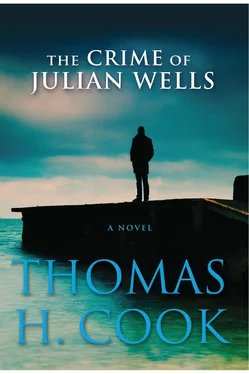Thomas Cook - The Crime of Julian Wells
Здесь есть возможность читать онлайн «Thomas Cook - The Crime of Julian Wells» весь текст электронной книги совершенно бесплатно (целиком полную версию без сокращений). В некоторых случаях можно слушать аудио, скачать через торрент в формате fb2 и присутствует краткое содержание. Год выпуска: 2012, ISBN: 2012, Издательство: Grove Press, Жанр: Криминальный детектив, на английском языке. Описание произведения, (предисловие) а так же отзывы посетителей доступны на портале библиотеки ЛибКат.
- Название:The Crime of Julian Wells
- Автор:
- Издательство:Grove Press
- Жанр:
- Год:2012
- ISBN:9780802194589
- Рейтинг книги:5 / 5. Голосов: 1
-
Избранное:Добавить в избранное
- Отзывы:
-
Ваша оценка:
- 100
- 1
- 2
- 3
- 4
- 5
The Crime of Julian Wells: краткое содержание, описание и аннотация
Предлагаем к чтению аннотацию, описание, краткое содержание или предисловие (зависит от того, что написал сам автор книги «The Crime of Julian Wells»). Если вы не нашли необходимую информацию о книге — напишите в комментариях, мы постараемся отыскать её.
The Crime of Julian Wells — читать онлайн бесплатно полную книгу (весь текст) целиком
Ниже представлен текст книги, разбитый по страницам. Система сохранения места последней прочитанной страницы, позволяет с удобством читать онлайн бесплатно книгу «The Crime of Julian Wells», без необходимости каждый раз заново искать на чём Вы остановились. Поставьте закладку, и сможете в любой момент перейти на страницу, на которой закончили чтение.
Интервал:
Закладка:
London had changed considerably since my last visit, the influx of immigrants having put its mark on such places as Oxford Street, where Middle Eastern men now smoked hookahs in sidewalk cafes and women strolled about in full burkas. These were changes that gave the city a deeper sense of intrigue, or so it seemed. For I couldn’t be sure that my present view of London as a place of plots and counterplots came from the actual changes I noted in the city itself or from the troubling details that were emerging from Julian’s life-especially the preoccupation with betrayal that marked both his books and his conversation.
Durrants was on a side street not far from Hyde Park. By the time I got there, one of London’s famous drizzles had settled in, along with a touch of fog. Beyond the bar’s small windows, I could see black umbrellas sprouting like dark flowers on the street.
“You must be Philip.”
I turned from the window to see a man standing at my table.
“Walter Hendricks,” he said. “I trust your father is well?”
“As well as can be expected,” I told him.
“For a man his age, you mean,” Hendricks said with a knowing grin. “And mine, too, for that matter.”
Hendricks, however, appeared far less frail than my father. In fact, there was something rough-and-tumble about him, a sense that he could still handle other men with a sure hand. His accent was Southern, of the type that held the soft twang of the Appalachians rather than the rounded o ’s of the Tidewater. Here was one whose ancestors had fought under Lee, rather than beside him, I thought, men who staggered back from Pickett’s charge to hear their general’s apology while trying hard not to notice that there was no blood on his sleek lapels.
“I would have expected you and Julian to have gone on the grand tour after college,” he said as he sat down opposite me. “Argentina always seemed to be an odd choice.” He smiled quite warmly. “‘The dusty places,’ your father used to call them. He had a soft spot for the people of those regions.” His smile grew into a soft chuckle. “I told him that he should spend some time in Timbuktu, where even the food tastes like dirt.”
“I’m sure he would have loved a posting like that,” I said in defense of my father. “To face that kind of reality.”
Hendricks’s laughter trailed away. “Not for long,” he said with the certainty of one who’d experienced such places. “No one likes that kind of reality for long.”
He glanced about the bar. “Have you ever been here?”
“No.”
He smiled. “Well, my guess is that many a plot was hatched in this place,” he said. We were sitting at a small, round table clearly meant to accommodate drinks only. “It wouldn’t surprise me if Reilly, Prince of Spies, once sat right in this corner, at this little table, and wondered if it might be possible to have Lenin assassinated.”
Even in such casual conversation, Hendricks’s eyes remained penetrating, the gaze of a man to whom one should not lie.
“I love history,” he added. “It’s the reason I retired to London, the sheer history of the place. I read history all the time. Probably as much as your father reads spy novels. He seemed to live in books back then.” He laughed. “He was reading The Thirty-Nine Steps the day I met him.”
“He doesn’t read now,” I said. “He watches old movies. Black-and-white mostly. From the forties.”
“Yes,” Hendricks said. “That would be his type.” His smile bore the usual indulgence that men of the world accord their dreamier compatriots, and in it I saw the most that was likely ever given to my father by the sturdier and far less idealistic souls who’d pulled the strings at Foggy Bottom. “Stories about lone heroes. That was what he wanted to be, I think.”
“But instead he lived his life behind a desk,” I said.
Hendricks nodded. “That’s true,” he admitted. “But I’m not sure your father would have functioned very effectively beyond a desk.”
“Really?”
Hendricks nodded. “As a matter of fact, he sometimes reminded me of what Trotsky said about Czar Nicholas.”
“Which was?”
“That he should have been a kindly neighborhood grocer or something of that sort,” Hendricks said. “A simple tradesman, invisible to history. But your father not only wanted to change the world, he wanted to do it by means of derring-do.” He laughed. “In C Building, he was the resident Walter Mitty.”
The resident Walter Mitty.
That was both the saddest and truest thing anyone had ever said about my father, that he had lived his life behind a desk while watching spy movies and reading spy books and dreaming of the romantic secret-agent life he would never have.
To think of my father in such a way pained me, so I turned the conversation away from him.
“So, the report on Marisol,” I said as a reminder of why I’d come to London.
“Marisol, yes,” Hendricks said. “I have to say that I am a bit curious as to why you’re so interested in your friend’s quixotic effort to find this young woman.”
“Was it quixotic?” I asked.
“I would call it that, yes,” Hendricks answered flatly. “He was trying to find someone he didn’t know much about in a country about which he knew even less. He had no connections in Argentina and no authority to conduct any sort of inquiry into this young woman’s whereabouts. And yet, he felt that he could simply and quite brazenly walk into Casa Rosada and ask whatever questions he liked.” He shook his head gravely. “Such a little boy.”
I recalled something Julian had said many years before. I’d been talking about Mussolini, how amazingly childlike he’d been, his love for mounting white horses and prancing about, his comical strut. The whole story had seemed to darken Julian’s mood, his voice very serious when he said, “He wasn’t funny to the Ethiopians.” With that, he’d shaken his head softly, then added, “Men with power shouldn’t be little boys.”
Hendricks’s gaze took on an added seriousness. “How could he have possibly expected anyone in authority to tell him anything? Not only where Marisol was or what had happened to her, but who she was?”
“Who she was?” I asked by way of directing the conversation back to her.
Hendricks smiled. “Nowadays they’d call her a ‘person of interest,’” he said.
“To Casa Rosada,” I added.
“Yes.”
“Why?”
“Because she was evidently working for a well-known Montonero named Emilio Vargas,” Hendricks answered matter-of-factly.
I tried to conceal my surprise. “Julian had a picture of Marisol with him,” I said. “Where would he have gotten it?”
“Perhaps he was more successful at Casa Rosada than I thought,” Hendricks answered with a shrug. “Anyway, as to Vargas. He was called ‘the Hook.’ It was his method of choice. To hang people on meat hooks.”
I remembered an atrocity Julian had once mentioned, an entire Balkan village rounded up and loaded onto trucks, then transported to the local abattoir, where every man, woman, and child was put through all the stages of animal slaughter. He had described the process so vividly and with such detail that I’d finally skipped ahead.
“Vargas was as vicious as they come,” Hendricks said. “Names were given to him and he had those people kidnapped. Their children, too, sometimes. Torturing them was Vargas’s specialty. He would have justified it, of course. And it’s true, there are people who can’t be broken by torture. But when they see their children, naked, strapped to a bed beside a small electric generator. .” He stopped. “I’m sure you get the picture.”
I nodded.
“He operated a torture farm in the Chaco,” Hendricks added.
Читать дальшеИнтервал:
Закладка:
Похожие книги на «The Crime of Julian Wells»
Представляем Вашему вниманию похожие книги на «The Crime of Julian Wells» списком для выбора. Мы отобрали схожую по названию и смыслу литературу в надежде предоставить читателям больше вариантов отыскать новые, интересные, ещё непрочитанные произведения.
Обсуждение, отзывы о книге «The Crime of Julian Wells» и просто собственные мнения читателей. Оставьте ваши комментарии, напишите, что Вы думаете о произведении, его смысле или главных героях. Укажите что конкретно понравилось, а что нет, и почему Вы так считаете.












